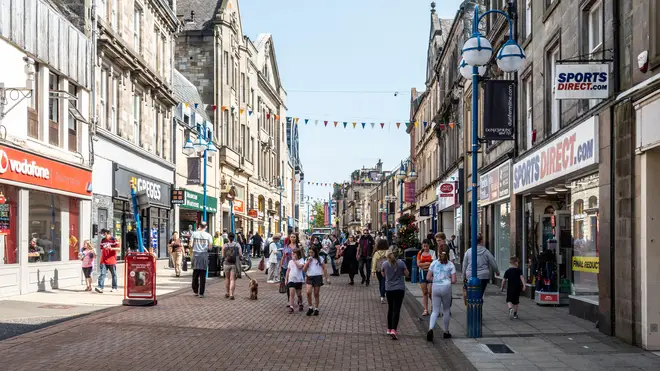
James O'Brien 10am - 1pm
5 September 2021, 19:15 | Updated: 5 September 2021, 19:17

Almost 50 shops per day closed down on British high streets, retail parks and shopping centres in the first half of 2021, according to research.
Research by accountancy firm PwC found 50 chain stores were shut each day in the first half of the year, but the rate of closures had slowed compared with the first six months of 2020.
Figures collected by the Local Data Company showed 8,739 shops shut across Britain in the first half of the year. With 3,488 opening in the same period, this reflected a net decrease of 5,251.
In the first half of last year as the Covid crisis began to bite, 11,120 shops closed for a net decrease of 6,001 - 750 more net closures than in the first six months of this year.
READ MORE: Grenfell Tower 'set to be demolished' more than four years after 72 died in fire
PcW said government pandemic supports such as the extended furlough scheme, business rates relief and government-underwritten loans have played major roles in helping operators stay afloat, along with the impact of the rent moratorium.
But the firm warned the second half of this year will be "make or break" for many outlets as Government assistance is wound down.
Lisa Hooker, leader of industry for consumer markets at PwC UK, said: "After an acceleration in store closures last year coupled with last-minute Christmas tier restrictions and lockdowns extending into 2021, we might have expected a higher number of store closures this year. Government support has proved to be a lifeline.
"However, the next six months will be make or break for many, particularly with the reinstatement of business rates, the winding down of furlough and the need for agreement on rent arrears, as well as uncertainty for hospitality businesses around further lockdowns, vaccine passports and other operating restrictions."
The study surveyed more than 200,000 outlets operated by businesses with more than five branches across Britain, including retail, restaurants, banks, cafes and gyms.
Fashion retailers were worst affected, with 1,063 stores closing in the first half of the year, ahead of charity shops with 452 closures, car and motorbike outlets (428) and betting shops (337).
City centres were hit the most severely as people and businesses moved more to suburban or out-of-town locations, reflecting the rise in working from home. City centres suffered a 4.3% drop in their number of retail outlets, compared with a 3% decrease for commuter towns and a 2.3% decline in villages.
London went from being the best-performing region by this measure in 2016, with a 0.9% fall, to the worst across the past two years, with a 2.9% drop, the study showed.
Retail parks, with 636 net closures, fared better in the first half of this year compared with high streets (3,643) and shopping centres (1,464).
Paddy Lillis, general secretary of the Union of Shop, Distributive and Allied Workers (Usdaw), said: "The UK retail sector has been impacted by the coronavirus pandemic on an unprecedented scale, as the staggering number of shop closures demonstrates.
"It is little comfort that there has been a slight improvement on last year and, for an industry already facing significant challenges, the long-term impact will be severe.
"With over 180,000 jobs lost across the industry last year and 200,000 predicted for this year, we need immediate action from the Government to reduce rents and rates for high street retailers, alongside levelling the playing field with an online sales tax.
"The coronavirus pandemic has pushed many retailers and retail workers to breaking point, so we need government measures to be equally significant.
"Retailers need urgent measures to deal with the immediate crisis and a longer term strategy to deal with some of the more fundamental structural issues facing the industry. Usdaw is calling for the Government to adopt an urgent recovery plan for the retail sector."